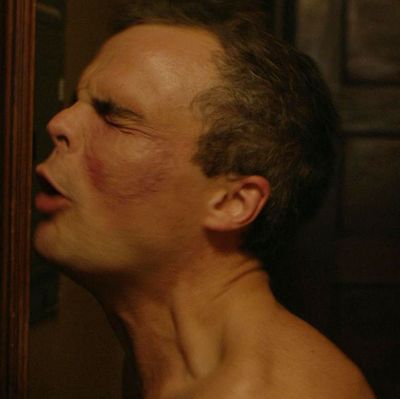
One of the very best American independent films you’ll see this year, John Magary’s The Mend, takes what could have easily been a mundane tale of brotherly dysfunction and turns it into something abstract and electrifying. It tells you in its opening scenes the kind of movie it is — and the kind of movie it isn’t. In a few brisk frames, we see scruffy fuck-up Mat (Josh Lucas) get kicked out of his girlfriend Andrea’s (Lucy Owen) apartment right after having sex with her. We never learn why he’s been given the boot, because Magary jumps around these scenes with seeming abandon — skipping over what might have been, in a different film, important details. Then we see Mat’s straitlaced lawyer brother Alan (Stephen Plunkett), in his apartment, arguing with his girlfriend Farrah (Mickey Sumner), over … well, let’s just say it’s another matter of a highly sexual nature. This time, Magary slows down — so that we hear every single excruciating detail of their rather intimate argument. As played by the fantastic Plunkett, Alan is frustrated and defensive, yet also obliging and apologetic. He’s everything Mat is not; Mat just balls, or bails, or balls and bails. And the movie’s very form reflects this division between the two men. But more on that in a bit.
Wandering the streets, effectively homeless, Mat does the most Mat thing imaginable. He comes across Alan’s apartment right as Alan and Farrah are having a party to celebrate the last performance of the season for her dance company, and, uninvited, he basically materializes on their couch — like some kind of stain or disease. As the party ambles on (and on and on), we see the ease with which Mat can insinuate himself into a situation, just by being his asshole self. Watching one of the dance company’s videos on a phone, two of the female dancers practically draped over him, he pronounces, “I am going to eat a bullet if we keep watching this!” But not long after, he’s drunkenly nailing one of those dancers in Alan’s cramped guest room.
Hilariously, the story proper only starts after this. (Most of those party guests are never heard from again.) Alan and Farrah are headed in the morning for a Quebec getaway, during which he intends to propose; they leave in a hung-over rush, unable even to clean up after their soiree — and unaware that the brother is in their guest room. So Mat wakes up to an empty, ruined house, and squats there. He even invites Andrea and her son, who themselves temporarily need a roof over their heads, as their own place has a bedbug infestation. (Wait — Andrea and Mat made up? How? When? Who cares?) Then, a couple of days later, Alan suddenly shows up. His girlfriend has left him, and now he’s a wreck, too.
Forgive me for offering so much plot detail for what is, on some level, a plotless movie. And all of this, of course, could have made for a fairly simple, tired, odd couple story. Watch the two very different brothers try to navigate the complexities of human relationships and wounded masculinity! Marvel as each learns something from the other! Coo as they all hug it out at the end! Instead, Magary lets the textures and tempos of his film turn into a struggle between these two men’s distinct energies — the fragmented, galloping imbalance of Mat’s world, with the orderly diffidence of Alan’s. It lets them collide, to create a unique, infectious rhythm all its own — propulsive one moment, obsessive and clinical the next, like someone had the bright idea of cross-breeding Mike Leigh’s Naked with David Cronenberg’s Dead Ringers.
One could easily go down a rabbit hole of interpretation and analysis with the film. There’s the odd, sexually charged back-and-forth between the brothers over Andrea, teased but never quite consummated. We get hints at the emotional torment Mat and Alan’s father bequeathed them — clearly a raw wound for Mat, even after all these years. (The father seems to appear, very briefly, in a surreal cutaway near the end.) The great Austin Pendleton shows up as an aging family friend living in a downtown loft, an echo of the cool, wild, dangerous New York of decades past, and he gets a riveting and pungent monologue about “the smell of your true self.” Does his presence evoke wonder, regret, pity — or some combination of all three?
A strange, dystopian mood settles over the film. Early on, during that aforementioned party, Alan gets in trouble for appropriating a quote from a James Wolcott review of the dance recital. “I felt like I was watching some survivalist tract from the future, like postapocalyptic semaphore,” he declares, as if he thought it up on the spot. That leads to a cringeing bit of comedy when he’s immediately called out for his borrowed pretension, but those words resonate as The Mend unfolds: A helicopter constantly flies overhead; the power goes out; when Alan, Mat, and Andrea wander the Brooklyn promenade, they joke about blowing up a bridge. Entropy prevails, and we feel at times like we’re watching a kind of spiritual apocalypse. It’s a situation that reflects Alan’s heartbreak, and brings him into the constant, queasy uncertainty of Mat’s world. We wonder: Is Alan learning that his brother’s bridge-burning, carefree-and-careless approach to life is ultimately healthier, since there’s so much devastation waiting around every corner? Or is there some strength in keeping your destructive impulses at bay? These are just some of the things Magary leaves unanswered, offering just enough context and detail before pulling back. And so, The Mend and its many provocations haunt us, long after the credits have rolled.


